Review of University of International Relations Beijing UIR-CIE
Sunday, October 17th, 2010 in: News
This is review of the UIR Language School in Beijing, as well as the surrounding area, and some general advice for language study in China.
How I found out about the school
My first trip to China was intended mostly to serve as a means of passage between Japan and the roof of the world. I very much wanted to visit the Himalayas and Annapurnas on my way to India. But the more I thought about it, the more I realized that I could and should spend more time in China (and every place I visit), to absorb the language and culture. It’s not enough to pass through a place to claim that you have been there. And so my concept of travel stretched from a sprint across the Asian continent into a slow, deliberate marathon. Another thing I realized was that if I really wanted this journey to have a lasting impact on my life, I should take the opportunity to learn some new skills. My friend Denise had just come back from a language school in Beijing called the University of International Relations (UIR), to help her fulfill her masters program’s language requirements, so I asked her about her experiences.
“Well, it’s a small school, but it’s one of the cheapest and most flexible I could find in Beijing. As far as learning goes, it really depends on what you put into it, but I thought it was worth the investment.” I did some research for myself and confirmed what she said; I couldn’t find a cheaper school in Beijing, and UIR allowed new students in at the beginning of each month, with a few different options for intensive study. My foremost concern was sending money to a school, sight unseen, based on some information gleaned from the internet, so it was really the fact that someone I knew and trusted had been there that helped me make my mind up. I got in touch with school administration and started filling out my application. Their e-mail responses were prompt and professional but friendly, especially when I mentioned my friend. They were also flexible with me when I had to change my arrival date, pushing it back by two months.
Money Matters
The application is more or less a formality to help apply for visas and such, I can’t imagine anyone actually being rejected by the school. The application fee is 50USD, non-refundable, and must be paid by wire transfer. This was a major hassle, as it actually cost me $30 at my bank to perform the wire transfer, which I thought was ridiculous (I also had to actually go to my bank to make the transfer, which was annoying). Learn how to accept credit cards, folks. Tuition and accommodation fees, if applicable, are due up front in cash when you arrive. They were a little flexible with me; I had trouble accessing my funds when I first arrived, so I ended up paying a week or two after classes started. They are incredibly tight about the tuition money you pay, however. The longer you stay at the school the more you get for your money. If you decide within the first two weeks that you like the school and you’ll be staying longer, you can just pay the difference in tuition, but after that you pay the full amount as if you were re-enrolling. I can imagine this being good to keep people from gaming the system somehow, but if you’ve been there 3 months already and want to stay another week or two, you shouldn’t have to pay the full rate (this actually happened to a friend). Also, there are pretty much no refunds, so if you decide or have an emergency that forces you to leave the school early, you are pretty much SOL as far as your money is concerned. In short, don’t expect to see back any of the money you give them. To illustrate this point, one friend decided to leave a week or two ahead of schedule, and asked if her friend could take the intensive classes she had already paid for; after all, the teachers don’t get paid if there’s no one to teach. Nope, you bought those classes for you, no one else can take your spot. For a country famous for its loose price tags and love of haggling, China sticks to their rules like stink on shit. The teacher didn’t get paid, and no refund was issued. The moral of the story is to always plan ahead.
The School
 The school itself is actually located in an annex building of a Super 8 Hotel, with classrooms ranging from small to very small. A student lounge adjacent to the office and classrooms has a big TV, a collection of DVDs and computers for internet use.
The school itself is actually located in an annex building of a Super 8 Hotel, with classrooms ranging from small to very small. A student lounge adjacent to the office and classrooms has a big TV, a collection of DVDs and computers for internet use.
The name of the school, 国际关系大学 might make one think that it is in the prestigious University of International Relations campus, but it is actually located in a small satellite location north of the Fourth Ring Road by the Erlizhuang (二里庄) bus terminal, between Wudaokou and the Olympic Stadium. The actual name of the school is 国际关系学院. Not really false advertising (I didn’t even know the difference until after I arrived), but it could be really confusing if you go to the main campus expecting to find a language school on the other side of town. Whenever official documents needed to be stamped, the office staff would take them to the main campus, so there is some sort of tenuous connection there, but I am not sure exactly. China is full of mystery like that.
The office staff speaks excellent English and can be helpful if you ask for it, otherwise you are pretty much on your own to discover banking, phone services, restaurants and other amenities for yourself. When my computer broke, Alan from the office went with me several times to Zhongguancun to get it repaired, sacrificing entire afternoons. Of course, it’s pretty much his job; when there isn’t any paperwork or tasks for him, he still has to hang out in the office, studying French or reading. The other students, depending on who they are, may be helpful enough to show you around to get you on your feet.
Accommodations
 The 宿舍 (sushe, student dorm) is located right next to the school, behind the Super 8. I believe the entire property is owned by the same guy, as the buildings are connected and the staff move about freely (most or all of the fuwuyuan live in a cramped apartment complex right behind the dorm). The sushe is about the same rate as a hotel in Beijing, and the rooms are roughly about as nice as those of the Super 8; not spectacular, but livable and furnished, with a mini fridge, water dispenser, bed, desk, wardrobe, AC and TV. They each have private bathrooms, which could be nicer, but after a while you get used to your shower being right above your toilet. If you are staying for less than two months, the room includes bedding (laundered weekly) and possibly internet and electricity. If you stay longer, the room rate drops considerably (to 70RMB per day), but bedding costs an extra 5RMB per day (you can buy your own sheets but you have to launder them yourself.
The 宿舍 (sushe, student dorm) is located right next to the school, behind the Super 8. I believe the entire property is owned by the same guy, as the buildings are connected and the staff move about freely (most or all of the fuwuyuan live in a cramped apartment complex right behind the dorm). The sushe is about the same rate as a hotel in Beijing, and the rooms are roughly about as nice as those of the Super 8; not spectacular, but livable and furnished, with a mini fridge, water dispenser, bed, desk, wardrobe, AC and TV. They each have private bathrooms, which could be nicer, but after a while you get used to your shower being right above your toilet. If you are staying for less than two months, the room includes bedding (laundered weekly) and possibly internet and electricity. If you stay longer, the room rate drops considerably (to 70RMB per day), but bedding costs an extra 5RMB per day (you can buy your own sheets but you have to launder them yourself. 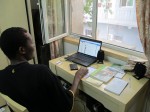 Each floor has a washing machine but no dryer, so makeshift clotheslines are ubiquitous). Internet costs 150RMB per month for an IP address to use the LAN connection in your room, no wireless. Electricity is 50RMB for 50 KW/hours, which can last anywhere from a week to a month depending on how much you use it. I barely used my TV and AC at all, only charging my cellphone and occasionally my laptop, and I finally ran out of electricity after 2.5-3 months. You aren’t supposed to cook in your room but people do anyways, buying hot plates and other supplies at the local markets. Staying in the dorms was more a matter of convenience and sociability; getting to know my fellow students and being close to the classroom. I enjoyed my time there.
Each floor has a washing machine but no dryer, so makeshift clotheslines are ubiquitous). Internet costs 150RMB per month for an IP address to use the LAN connection in your room, no wireless. Electricity is 50RMB for 50 KW/hours, which can last anywhere from a week to a month depending on how much you use it. I barely used my TV and AC at all, only charging my cellphone and occasionally my laptop, and I finally ran out of electricity after 2.5-3 months. You aren’t supposed to cook in your room but people do anyways, buying hot plates and other supplies at the local markets. Staying in the dorms was more a matter of convenience and sociability; getting to know my fellow students and being close to the classroom. I enjoyed my time there.
Host families may be available on request. I was going to stay with one at first, since it was the highlight of my time in Japan and helps you absorb the language that much better, but when I changed my arrival date I had to give up on the host family and stay in the dorms instead. They both have their advantages and disadvantages, so I suggest you weigh the pros and cons carefully before making a decision that fits you best.
The Neighborhood
The area around the school is a quiet suburb of Beijing, but far from being boring. It’s close to the Agricultural University (中国农业大学) and BLCU (Beijing Language and Culture University, 北京语言文化大学), which are teeming with young people and have decent sports facilities (both schools have friendly climbing clubs and their own walls). In fact, the whole area has quite a number of schools, including Peking University, which has a beautiful campus. The closest subway station is Wudaokou, which is surrounded by restaurants, cafes, stores, street markets, bars and clubs to serve the local college population.  The area immediately surrounding the school is much quieter, but with plenty of restaurants and other amenities. Getting anywhere is relatively simple, as Erlizhuang is a pretty well-known bus terminal, and most cab drivers know of it as well. Of course, how much fun you have is entirely dependent on you, whether you enjoy sitting in the student lounge watching bootleg Chinese DVDs, exploring the street markets and side streets around the school, playing sports or working out at a local university campus, trying the different foods available (caution, most Chinese restaurants around the school are pretty much equivalent to each other), or going out drinking and partying, you can do all of this without venturing too far from home. Or you could go to the much fancier and more expensive Sanlitun area for unsustainable shopping and partying, or check out any of the dozens of touristy locations around town.
The area immediately surrounding the school is much quieter, but with plenty of restaurants and other amenities. Getting anywhere is relatively simple, as Erlizhuang is a pretty well-known bus terminal, and most cab drivers know of it as well. Of course, how much fun you have is entirely dependent on you, whether you enjoy sitting in the student lounge watching bootleg Chinese DVDs, exploring the street markets and side streets around the school, playing sports or working out at a local university campus, trying the different foods available (caution, most Chinese restaurants around the school are pretty much equivalent to each other), or going out drinking and partying, you can do all of this without venturing too far from home. Or you could go to the much fancier and more expensive Sanlitun area for unsustainable shopping and partying, or check out any of the dozens of touristy locations around town.
The Classes
 For most of my time there, my class only had 2-3 students, including myself. Some other classes only had one student, and others had up to ten or more. The classes are broken down by levels of proficiency ranging from A班 (beginner) to D班 (advanced). Since students came and left on varying schedules, there might be a range of abilities in each class. If there are enough students between levels, the school would add a new stratification to better suit their needs, like creating an A+ class if brand new students came in but the class wasn’t ready for B般 material. I applaud the school for their efforts, and at the very least, they tried to make sure we weren’t just wasting our time and money in class. Nevertheless, catering to each student’s needs is nigh impossible, and if you are really looking for special consideration, you might want to look into private lessons, which the school offers for 70RMB per hour.
For most of my time there, my class only had 2-3 students, including myself. Some other classes only had one student, and others had up to ten or more. The classes are broken down by levels of proficiency ranging from A班 (beginner) to D班 (advanced). Since students came and left on varying schedules, there might be a range of abilities in each class. If there are enough students between levels, the school would add a new stratification to better suit their needs, like creating an A+ class if brand new students came in but the class wasn’t ready for B般 material. I applaud the school for their efforts, and at the very least, they tried to make sure we weren’t just wasting our time and money in class. Nevertheless, catering to each student’s needs is nigh impossible, and if you are really looking for special consideration, you might want to look into private lessons, which the school offers for 70RMB per hour.
 Classes can be a mixed bag, and it’s true that you get what you put into them. I started in the very beginning class, because I couldn’t speak Chinese at all, but having already studied Japanese, I had a huge advantage with the characters; the two languages share a lot of words, so aside from having to familiarize myself with simplified hanzi (Japanese kanji is much closer to the traditional characters used in Hong Kong and Taiwan; the mainland mostly uses simplified characters now), I already had a pretty strong vocabulary… I just didn’t know how to pronounce anything. This was a bit unfair to my classmates, so their were times when I could sense that everyone was frustrated by this. This sort of thing isn’t the norm, but it happens. There were several Asian students who either had advantages with the written language (like my half-Japanese friend Andy) or had an ear for the language because they had been exposed to other dialects (students from Guandong, Hong Kong, Malaysia or Singapore). The age range is vast, sometimes dipping into the mid-teens, and up into the 40’s and beyond, but the average age is early 20’s. Some students have goals to achieve and are exceptionally hard-working, and they clearly benefit from their study habits. Some students are just there for the experience, and want to learn what they can (like me), and some students are just there because their parents want them to be, and really couldn’t care less about the classes.
Classes can be a mixed bag, and it’s true that you get what you put into them. I started in the very beginning class, because I couldn’t speak Chinese at all, but having already studied Japanese, I had a huge advantage with the characters; the two languages share a lot of words, so aside from having to familiarize myself with simplified hanzi (Japanese kanji is much closer to the traditional characters used in Hong Kong and Taiwan; the mainland mostly uses simplified characters now), I already had a pretty strong vocabulary… I just didn’t know how to pronounce anything. This was a bit unfair to my classmates, so their were times when I could sense that everyone was frustrated by this. This sort of thing isn’t the norm, but it happens. There were several Asian students who either had advantages with the written language (like my half-Japanese friend Andy) or had an ear for the language because they had been exposed to other dialects (students from Guandong, Hong Kong, Malaysia or Singapore). The age range is vast, sometimes dipping into the mid-teens, and up into the 40’s and beyond, but the average age is early 20’s. Some students have goals to achieve and are exceptionally hard-working, and they clearly benefit from their study habits. Some students are just there for the experience, and want to learn what they can (like me), and some students are just there because their parents want them to be, and really couldn’t care less about the classes.
The teachers are also a mixed bag: some are pretty awesome (I really liked my Wang-laoshi, who was very helpful and spent time outside of class to help me write a few of the Chinese notes I’ve posted here), and some are… less than liked by their students (a couple teachers were let go for this reason, so you might not be stuck with a bad teacher). As far as I know, they are all grad students at BLCU, pursuing a degree in teaching Chinese as a second language. They teach to gain experience for their degrees, and to make some money, but from what I can gather, it isn’t much. The books are provided by the school and published by BLCU; they aren’t spectacular but they do their job. I believe that Chinese sort of has a W-shaped learning curve, steep at the beginning that eases off when you start getting the hang of things, but to really advance and master the language you have another steep curve to tackle. Since I was starting from close to scratch with spoken Chinese, I’d say the classes did a good job within 2-3 months of getting me over that first hump, giving me enough of a foundation to not starve on my travels.
Extracurriculars
 In the three months I was there, I attended two field trips that the school had arranged for us, to Longqingxia and Shidu. Both were very pleasant experiences, and a welcome change of scenery. In fact, my favorite time in Beijing was actually spent outside of the city, hiking on the ruins of the Great Wall with the Beijing Hikers. Having gone on hikes on my own around Beijing, I can safely say that the Beijing Hiker’s trips are incredibly well organized and a great value. My other favorite pastimes included going to Yugong Yishan on Monday nights to play with the Beijing Juggling Club, or taking my friends to climb, slackline and play soccer at Beijing’s college campuses or climbing gyms. Group activities are a fun way to meet new people with shared interests, both amongst your fellow students and strangers alike.
In the three months I was there, I attended two field trips that the school had arranged for us, to Longqingxia and Shidu. Both were very pleasant experiences, and a welcome change of scenery. In fact, my favorite time in Beijing was actually spent outside of the city, hiking on the ruins of the Great Wall with the Beijing Hikers. Having gone on hikes on my own around Beijing, I can safely say that the Beijing Hiker’s trips are incredibly well organized and a great value. My other favorite pastimes included going to Yugong Yishan on Monday nights to play with the Beijing Juggling Club, or taking my friends to climb, slackline and play soccer at Beijing’s college campuses or climbing gyms. Group activities are a fun way to meet new people with shared interests, both amongst your fellow students and strangers alike.
Conclusion
 The programs at UIR proved to be quite sufficient for my needs, and I would recommend it to anyone who has looking into it and decided that this is a good fit for them. The biggest pro that other schools can’t offer is their scheduling flexibility–classes that start every month mean you can come and study when you are ready, instead of conforming to a semester schedule. The school is also cheaper than other options in Beijing, and almost certainly has fewer students in each class (I was told by BLCU students who lived in the sushe that they paid more for a larger class, and that UIR was a better value). Despite this apparent flexibility, they are also unfortunately inflexible about other things, mainly money. Once you pay them, don’t expect to see any of it back. I doubt this is unusual in China, it just requires a little more planning beforehand.
The programs at UIR proved to be quite sufficient for my needs, and I would recommend it to anyone who has looking into it and decided that this is a good fit for them. The biggest pro that other schools can’t offer is their scheduling flexibility–classes that start every month mean you can come and study when you are ready, instead of conforming to a semester schedule. The school is also cheaper than other options in Beijing, and almost certainly has fewer students in each class (I was told by BLCU students who lived in the sushe that they paid more for a larger class, and that UIR was a better value). Despite this apparent flexibility, they are also unfortunately inflexible about other things, mainly money. Once you pay them, don’t expect to see any of it back. I doubt this is unusual in China, it just requires a little more planning beforehand.
 One thing I strongly recommend is looking into language partners; the more you practice the more you’ll progress. The best students had several language partners they met on a weekly basis over coffee or something. Not all language partners are equal, apparently the office isn’t very good at finding “zhongguo pengyous” for you, so ask your teacher or go out and make some Chinese friends of your own. My proudest moments came from long discussions with Wang Xing, the owner of Happiness Cafe (now a Xi’an noodle shop) down the street from the school. I would walk out of the cafe and realize that I had spent the last half hour engaged in a conversation in Chinese and actually understanding a good amount of what was being said. It blew my mind.
One thing I strongly recommend is looking into language partners; the more you practice the more you’ll progress. The best students had several language partners they met on a weekly basis over coffee or something. Not all language partners are equal, apparently the office isn’t very good at finding “zhongguo pengyous” for you, so ask your teacher or go out and make some Chinese friends of your own. My proudest moments came from long discussions with Wang Xing, the owner of Happiness Cafe (now a Xi’an noodle shop) down the street from the school. I would walk out of the cafe and realize that I had spent the last half hour engaged in a conversation in Chinese and actually understanding a good amount of what was being said. It blew my mind.
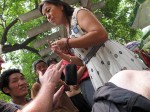 My last suggestion for practice is to travel. I did a little traveling on my own and accompanied by a Chinese friend before I got to the school, and again after my 3 months at UIR. It’s a totally different experience when you have a little language skill, and a great way not only to reinforce what you’ve learned, but to show yourself how far you’ve progressed. Plus the Chinese countryside is beautiful, you should see it for yourself. I’d recommend avoiding touristy places if you can (read my posts about Xi’an for my reasoning).
My last suggestion for practice is to travel. I did a little traveling on my own and accompanied by a Chinese friend before I got to the school, and again after my 3 months at UIR. It’s a totally different experience when you have a little language skill, and a great way not only to reinforce what you’ve learned, but to show yourself how far you’ve progressed. Plus the Chinese countryside is beautiful, you should see it for yourself. I’d recommend avoiding touristy places if you can (read my posts about Xi’an for my reasoning).
The biggest caveat is that your mileage WILL vary. Since students come and go so often, this was just my experience in the 3 months I was there; there really is no telling what kind of group you will find yourself in. I personally made a lot of great friends through UIR and I’m very glad I went. I know I could have studied cheaper in a smaller city, but the experience was worth the difference.

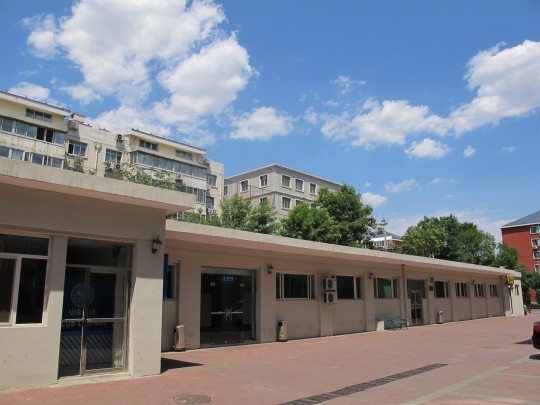
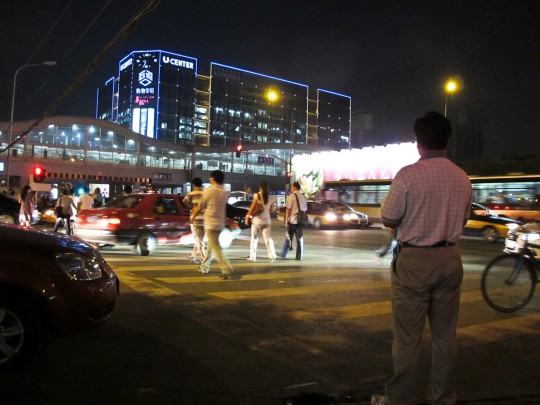
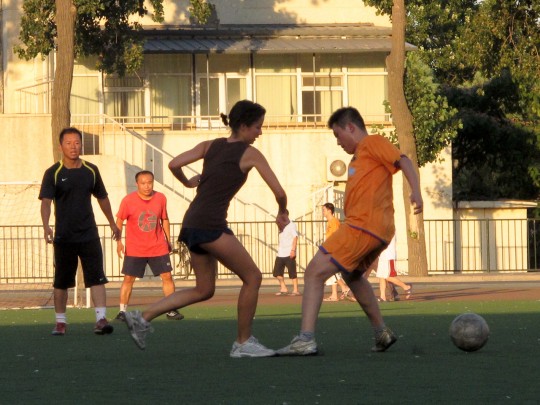

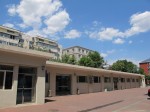



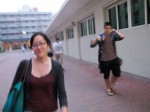










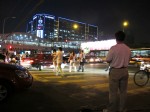

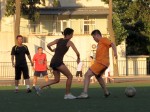

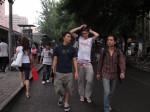






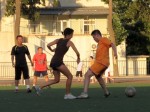







Hello,
Thanks for the review! It really helped me in choosing a language school in Beijing.
I will be going there this winter, I hope it will be a nice experience.
Cheers!
Thank you for this work. I’m going to into this program this summer. Your review helped me a lot.